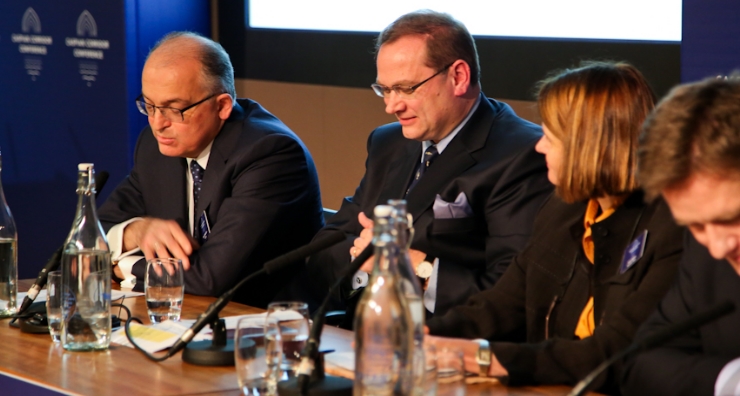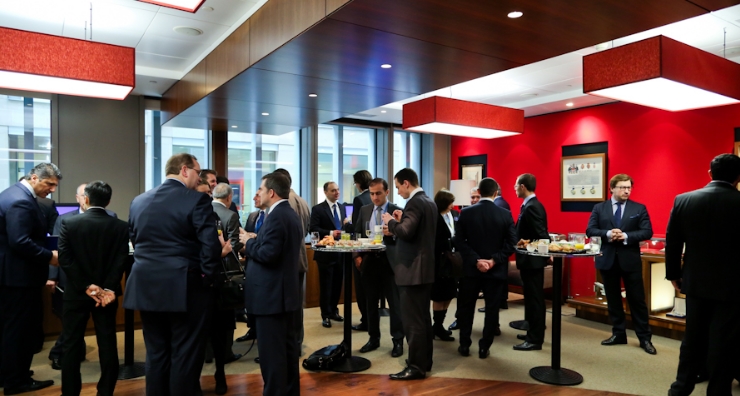Driving commercial and political engagement between Asia, the Middle East and Europe
Driving commercial and political engagement between Asia, the Middle East and Europe
Driving commercial and political engagement between Asia, the Middle East and Europe

The Southern Gas Corridor, which is expected to transport gas from Azerbaijan to Europe for the first time by 2019, will create thousands of jobs, bring gas prices down and decrease Europe’s gas dependence on Russia.
Until now, most gas in Europe has been imported by pipeline from Eastern Russia, Northern Norway and North Africa but the opening up of a fourth major natural gas corridor is of great significance as it will open Europe up to vast gas supplies from the Caspian region and Middle East creating greater energy security for Europe so it is not overly reliant on volatile regions and also improve the EU’s negotiating position with current suppliers.
The Corridor will have the potential to meet up to 20 per cent of the EU’s gas needs in the long term: Europe will get 10 billion cubic metres (bcm) of gas per year starting from the end of 2019 that will travel from the Shah Deniz II gas field in Azerbaijan some 3,500 kilometres to Europe. New gas supplies are in particular high demand in the Western Balkans.
Some regard the Southern Gas Corridor to Europe as the single most important energy security project in Europe. It will expand the South Caucasus Pipeline through Azerbaijan and Georgia and involve the construction of a new 2,000 km long and 56 inch wide pipeline, the Trans Anatolian Gas Pipeline (TANAP) across Turkey.
It will also require the construction of a 867 km Trans Adriatic Pipeline (TAP), via Greece and Albania, and across the Adriatic Sea to Southern Italy, and further to Western Europe. Once upgraded, the South Caucasus Pipeline’s capacity will increase to more than 19 bcm.
Azerbaijan’s state oil company SOCAR is the main shareholder of the TANAP Pipeline, a key shareholder in TAP and a partner in the Shah Deniz consortium, the consortium of companies which hold the licence to extract the gas from the Shah Deniz II gas field in Azerbaijan, the primary source of gas for the new Corridor.
Speaking at the Second Caspian Corridor Conference, which was held at the London Stock Exchange in March 2014, Vice-President of SOCAR Elshad Nassirov said: “100 years ago three quarters of the cars driven in the UK used Azerbaijan gasoline. Baku (the capital of Azerbaijan) is very important for the world. The highest peak in oil prices in real value was in 1920 (when the Red Army invaded and the city was occupied by Bolsheviks). At the beginning of the 20th century Baku was producing half of the world’s oil.”
He added that Shell was created in Baku and from the beginning of the 1920s until the beginning of World War II, Azerbaijan was a world centre for oil science and technology.
“All inventions are created first in Baku and then reproduced in other regions,” he said. “Hard work over the last decade has culminated in the creation of the Southern Gas Corridor. Azerbaijan is a landlocked country so we are very happy that multiple pipelines will transport oil to several destinations.”
The world’s first oil well was drilled in 1848 in Apsheron near Baku. This took place 11years prior to the drilling of the first oil well in Pennsylvania making Azerbaijan one of the oldest oil producing countries in the world. But the country is now emerging as a natural gas supplier too. “Azerbaijan is the only country in the world that once imported gas that is now an exporter of gas,” Nassirov said.
“Our global goal is to transport big volumes of gas to the EU, Russia, Georgia and Turkey,” he added.
The total cost of the Shah Deniz Stage 2 and South Caucasus Pipeline expansion projects will be around US$28bn.
Nassirov said the huge pipeline being created was very important for Europe and the Caspian region. “It will be the first flow of gas connecting the sea to the Caspian region. The more gas we can transport, the less money people will need to pay for it,” he said, referring to the 25-year contracts in place with certain European countries. “This is a very expensive project and pipeline but very important for Caspian and the EU. This pipeline provides energy security to Europe. There are territorial disputes so we have to make sure the territorial integrity of the region is secure.”
Azerbaijan currently exports 2 billion m3 gas to Russia and it also supplies Iran. The Shah Deniz field is located deep in the Caspian Sea, 70 km from Baku.
Gordon Birrell, regional president for BP Exploration (Caspian Sea) Ltd, said BP had been operating in the Caspian region for more than 20 years and the region continued to provide exciting new investment opportunities. “It’s one of the biggest production regions of BP,” he said mentioning the Southern Gas Corridor, Shah Deniz and further development of the Azeri–Chirag–Guneshli (ACG) large complex of oil fields in the Caspian Sea, which is about 120 kilometres off the coast of Azerbaijan. The ACG fields have estimated recoverable reserves of about five to six billion barrels of petroleum.
Birrell said they have been producing oil from AGC for the past 18 years. “It’s off its peak but will continue for decades. BP and the companies we are in consortium with are looking forward to finding further investment opportunities to prolong the oil production from that field. We want to develop ACG oil and Shah Deniz Stage 2 and there are many more opportunities that we believe exist where we can invest. We have about 1,800 men and women working for us (more than 80 per cent Azerbaijani nationals) and lots of Turks and in the future no doubt Italians and Albanians. We have invested more than $50bn in this region so we are very committed.”
He said BP thought the Caspian Region was a good place to invest because contract law was strictly adhered to. “Not once has the government tried to change contracts we operate under. It’s very important that what we sign up to on Day 1 exists 20 years later. Stability is key to the partners of SOCAR and if we create a certain stability that will enable us to continue to invest.”
Birrell said the Shah Deniz consortium, of which BP was a major shareholder, had contracts for significant volumes of gas to be sold to Europe.
The deal to create a new Southern Gas Corridor to bring Caspian gas to Europe was signed in December 2013 and a decision made to connect it to the Trans Adriatic Pipeline.
“We are drilling wells and hardware is going in the ground. It’s an exciting project. We are bringing new technology developed in the Gulf of Mexico and Angola,” Birrell said.
“It’s very difficult drilling in Caspian but we are bringing the best talent from the industry to help us be successful. They are very challenging wells to drill there. We are getting faster as we go but it is an uphill learning curve,” he added.
Dr Marc van Grondelle, Global Head of Joint Ventures Practice at KPMG, said: “I am a lifelong oil man. We build joint ventures. The region is very rich in opportunities and there are a growing number of JVs between international oil companies and local partners.”

The Second Caspian Corridor Conference provided ample opportunities for networking. Photo by Matt Chung
He said there was now much more interest from “mid-sized” international oil companies wanting to go to that region which were making up the next tier of oil companies, so in the future there would be more oil companies there, not just BP and Shell.
But he warned: “The region is challenging and there are lots of project overruns.”
Nassirov said he was not worried about competition since the Shah Deniz consortium gas sales were already in place. “I do not see any obstacles, environmental or legal to the pipeline,” he concluded.
naomi.canton@asiahouse.co.uk
To read about the major deal that was struck at the Second Caspian Corridor Conference click here.
